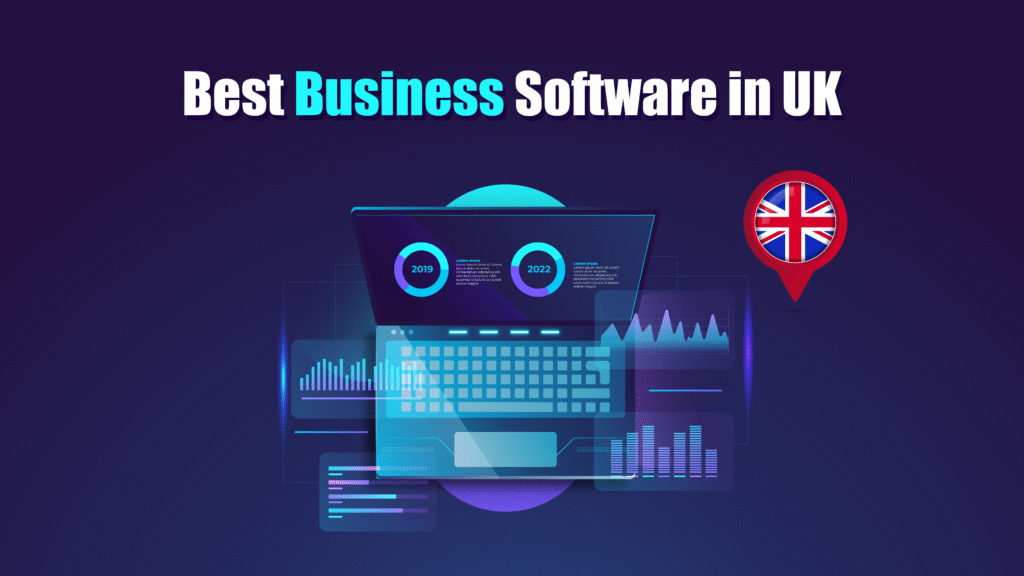When it comes to running a successful business in the UK, having the right software solutions in place can significantly impact growth, productivity, and agility. From finance and HR to project management and customer engagement, business software has become the backbone of modern operations. Whether you run a startup in Manchester or a multinational firm in London, selecting the right tools is essential.
Boost operational performance across UK industries with intelligent business software. These platforms help automate processes, reduce manual workload, and improve accuracy ensuring businesses stay competitive in a digitally driven economy.
More than 80% of leading UK businesses rely on dedicated software to manage core operations. Industry leaders like Tesco, Barclays, and Rolls-Royce adopt powerful tools such as Sage, Xero, and Monday.com to ensure seamless workflow, data integrity, and decision-making efficiency.
From accounting to CRM, today’s best business software options go beyond simple functionality. They offer cloud access, scalability, and integration that adapt to evolving business needs. When choosing a tool, UK companies consider compliance standards, ease of use, and local customer support to make the right investment.
Here are some of the best business software solutions in the UK today:
- Sage Business Cloud Accounting – A widely trusted UK accounting platform that offers robust features for invoicing, VAT submissions, and cash flow management. Ideal for small businesses and accountants needing MTD compliance and real-time insights.
- Xero – Known for its user-friendly interface and strong mobile capabilities. It’s cloud-based and supports real-time collaboration between businesses and their accountants. Offers easy bank reconciliation, payroll integration, and automated invoicing.
- QuickBooks UK Edition – Popular among startups and SMEs, QuickBooks provides essential accounting features tailored for UK tax laws and reporting standards. Includes project tracking, expense management, and direct HMRC submissions.
- Monday.com – A versatile project and team management tool gaining rapid traction across UK sectors. Enables collaboration, task automation, and workflow customization. Particularly useful for marketing, IT, and operations teams.
Discover the top 15 business software tools helping UK companies thrive in 2026. From finance to productivity, these platforms keep operations smooth, smart, and competitive.
Top 15 Best Business Software in UK
- Sage Business Cloud Accounting – Trusted UK accounting software for SMEs.
- QuickBooks UK – Popular tool for bookkeeping, payroll, and VAT.
- Xero – Cloud-based accounting built for UK businesses.
- Monday.com – Flexible project management platform.
- Trello – Visual task management with Kanban boards.
- Zoho CRM – Streamlines sales and customer data.
- Slack – Real-time team messaging and file sharing.
- Microsoft 365 – Full suite of productivity tools.
- Google Workspace – Online collaboration tools.
- Salesforce – Advanced CRM and analytics.
- Shopify – Leading UK e-commerce platform.
- FreshBooks – Easy accounting for UK freelancers.
- ClickUp – Centralized work hub for UK teams.
- Notion – All-in-one digital workspace.
- Pleo – Smart expense management solution.
Before You Proceed…
Choosing the right business software is essential for staying efficient, productive, and competitive in today’s fast-moving UK market. From managing finances to boosting team collaboration, the right tool can make everyday operations smoother and smarter.
“Today’s business tools do more than support tasks they empower teams to grow, adapt, and succeed,” says Emily Clarke, UK Business Software Analyst.
Questions to Ask When Choosing the Right Business Software for Your Company:
- Does it offer key features like automation, integration, and real-time tracking?
- Is the platform easy to use for teams with varying tech skills?
- Can it connect smoothly with tools you already use (like accounting, CRM, or project management systems)?
- Will it scale as your business grows?
- How flexible is it in adapting to your unique processes?
We kept all these questions in mind while researching. Now, let’s explore the top-performing business software solutions powering success across the UK.
How This Top 15 List Was Created
To bring you the most relevant and reliable business software in the UK, we analyzed dozens of platforms across multiple industries. Each tool was assessed based on core functionality, user experience, pricing, scalability, and integration capabilities.
Our research included 70+ hours of hands-on testing, expert insights, and in-depth reviews from real UK-based users. Whether you’re a startup in need of agile tools or an enterprise seeking robust solutions, this list covers business software that delivers real results for UK companies of all sizes.
Differences in Pricing and Pricing Models
Pricing plays a key role when selecting the right business software, but it’s not always straightforward. Some platforms charge per user, others base it on storage, and some tier features behind paywalls.
Cost Considerations for Small UK Businesses:
For startups and small businesses in the UK, tools like Xero, Zoho Books, and Trello offer accessible pricing with essential features. They provide a great balance of affordability and utility for companies just getting started or working with lean budgets.
Cost Considerations for Medium to Large Enterprises
Larger UK enterprises often turn to comprehensive platforms like Sage Intacct, Microsoft Dynamics 365, or Salesforce, which offer advanced features, better customization, and robust scalability. While these come at a higher cost, they often justify the investment through increased productivity and insights.
Curious which software aligns with your company’s size, budget, and goals? Let’s dive into the top 15 business software tools currently making an impact across the UK!
#1 – Sage Business Cloud Accounting – Streamlined Financial Management for UK SMEs
Sage Business Cloud Accounting is a cloud-based accounting solution tailored for small to medium-sized enterprises (SMEs) in the UK. It offers intuitive tools for invoicing, expense tracking, and VAT submissions, making it a go-to choice for service-based businesses like contractors, consultants, and tradespeople.
Review
Sage stands out for its user-friendly interface and robust features that cater to the specific needs of UK businesses. Its real-time dashboards provide a clear overview of financial health, while the mobile app ensures on-the-go access. Users appreciate its compliance with Making Tax Digital (MTD) regulations, simplifying VAT returns and financial reporting.
Features of Sage Business Cloud Accounting
- Invoicing and Quoting: Create and send professional invoices and quotes quickly.
- Expense Management: Track and categorize expenses to monitor spending.
- Bank Integration: Connect bank accounts for real-time transaction updates.
- VAT Management: Automatically calculate and submit VAT returns in line with HMRC requirements.
- Reporting: Generate insightful financial reports to aid decision-making.
Final Verdict
Sage Business Cloud Accounting offers a comprehensive suite of tools that simplify financial management for UK SMEs. Its emphasis on compliance, coupled with user-friendly features, makes it a reliable choice for businesses aiming to streamline their accounting processes.
Pros of Sage Business Cloud Accounting
- Designed specifically for UK businesses with MTD compliance.
- User-friendly interface suitable for non-accountants.
- Real-time financial dashboards and reporting.
- Mobile app for accounting on-the-go.
Cons of Sage Business Cloud Accounting
- Limited customization options compared to some competitors.
- Advanced features may require higher-tier plans.
#2 – QuickBooks UK – Popular Tool for Bookkeeping, Payroll, and VAT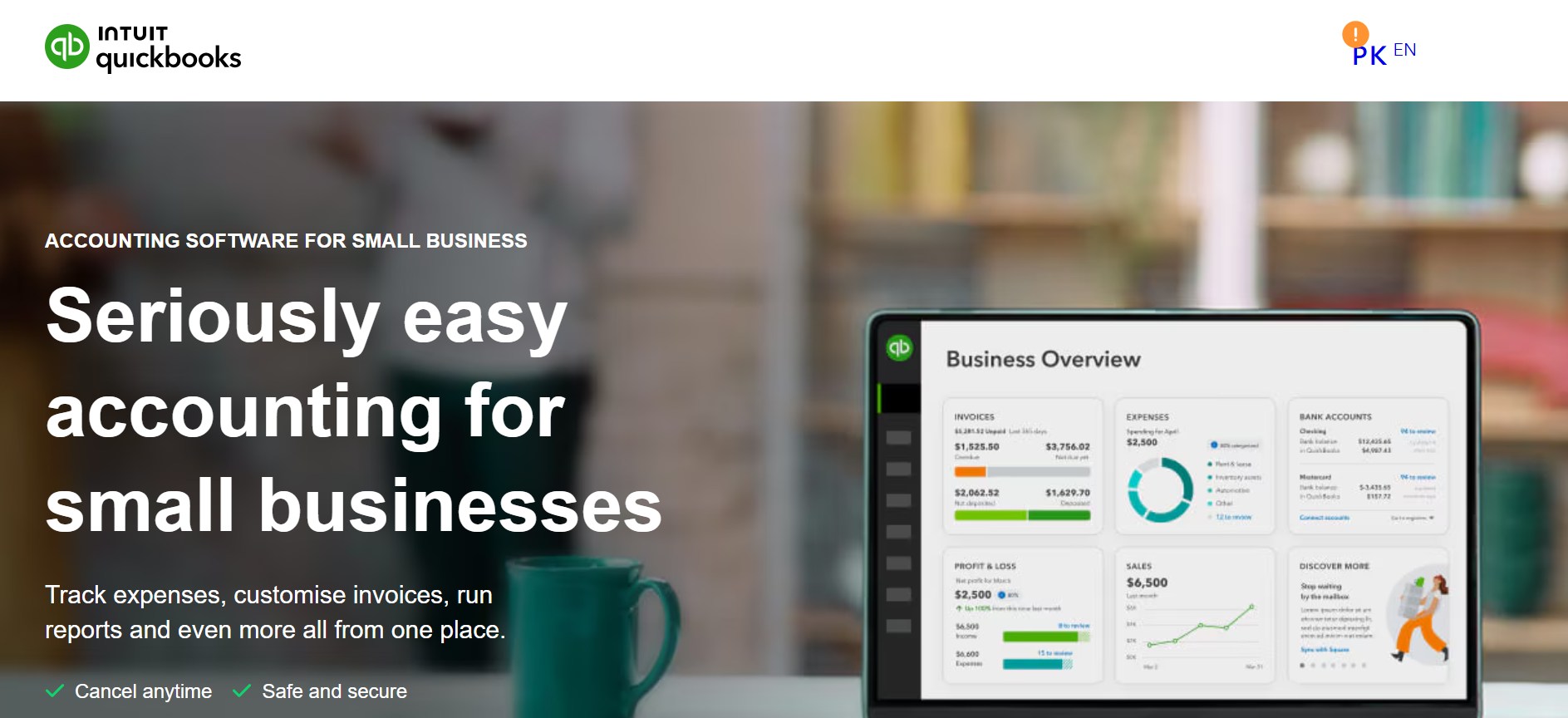
QuickBooks UK is a widely used accounting software tailored for the needs of small to medium-sized enterprises (SMEs) in the UK. Known for its robust bookkeeping, VAT management, and payroll features, QuickBooks simplifies the complex world of financial management for business owners who want reliable tools without needing to be financial experts.
Review
QuickBooks UK offers an efficient platform for managing finances in real time. It excels in handling everything from income and expense tracking to preparing for self-assessment and VAT submissions. The intuitive dashboard provides a snapshot of your financial health, while automation features reduce the need for manual data entry. Its payroll system ensures accurate employee payments and automatic tax calculations. What stands out is how QuickBooks helps SMEs stay compliant with UK tax regulations, including Making Tax Digital (MTD). Integration with over 750 third-party apps makes it a versatile tool for managing various business operations.
Key Features of QuickBooks UK
- VAT Management: Easily manage VAT returns and submit directly to HMRC in compliance with MTD regulations.
- Invoicing and Payments: Create custom invoices and accept payments online, speeding up cash flow.
- Payroll Services: Automatically calculate and file payroll taxes with options for pensions and RTI submissions.
- Expense Tracking: Snap photos of receipts and categorize them instantly with mobile app support.
- Bank Reconciliation: Sync with UK bank accounts and reconcile transactions to ensure accuracy.
- Multi-User Access: Collaborate with your accountant or team members with different access levels.
Final Verdict
QuickBooks UK continues to be a top-tier choice for SMEs in the United Kingdom thanks to its compliance-ready features and user-friendly interface. Whether you’re self-employed, managing a small team, or scaling up, it offers the flexibility and insights needed to maintain accurate, real-time financial oversight. It eliminates unnecessary manual work and improves decision-making with up-to-date reporting tools.
Pros of QuickBooks UK
- Fully compliant with HMRC and MTD standards
- Payroll and VAT tools designed for UK laws
- Highly customizable invoicing and reporting
- Mobile app with receipt capture and mileage tracking
- Large ecosystem of integrations for scalability
Cons of QuickBooks UK
- May be overwhelming for complete beginners
- Higher-tier features can become costly
- Occasional sync delays with bank feeds
#3 – Xero – Cloud-Based Accounting Built for UK Businesses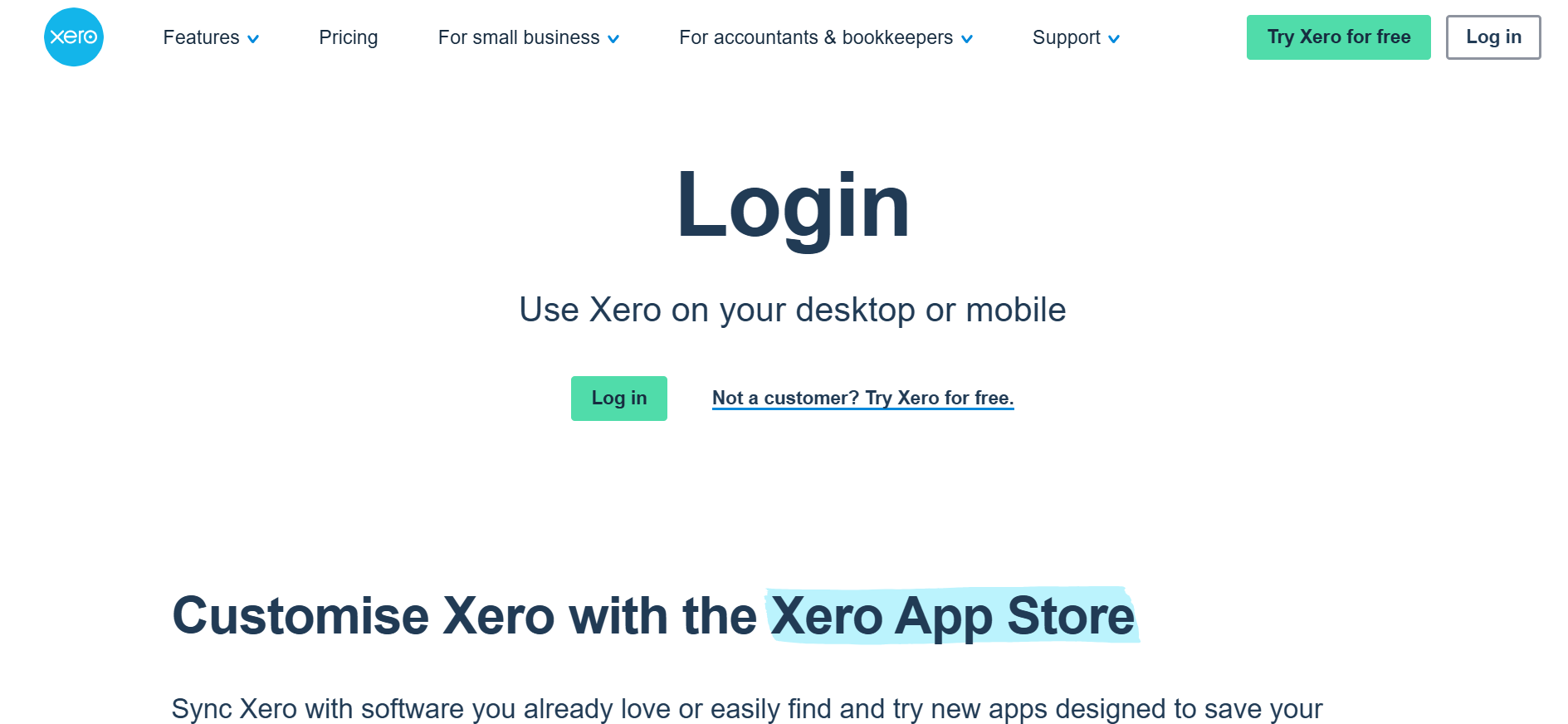
Xero is a powerful cloud-based accounting solution that has gained popularity among UK businesses due to its simplicity and scalability. Designed for small and medium-sized enterprises, Xero provides businesses with a user-friendly interface and powerful accounting features to streamline financial management. With features like real-time collaboration, invoicing, payroll, and VAT reporting, Xero ensures that UK businesses remain compliant with tax regulations while efficiently managing their finances.
Review
Xero is an excellent choice for UK businesses seeking a comprehensive and user-friendly accounting tool. The platform simplifies key financial tasks, such as VAT submissions, payroll management, and bank reconciliations, all while offering real-time collaboration for teams. With its intuitive design and cloud-based nature, Xero allows businesses to manage their finances from anywhere, ensuring that users always have up-to-date information. The system also integrates seamlessly with other business applications, making it easy to expand its functionality.
Features of Xero
- Real-Time Collaboration: Allows multiple users to collaborate in real-time, making it ideal for teams and accountants working together.
- VAT Management: Ensures that VAT is calculated automatically and generates VAT returns in compliance with HMRC regulations.
- Payroll Integration: Streamlines payroll processing and ensures employees are paid accurately and on time.
- Bank Reconciliation: Easily connects to UK banks, enabling smooth bank reconciliations.
- Customizable Invoices: Create and send branded invoices with flexible payment options.
Final Verdict
Xero is an excellent cloud-based accounting solution for UK businesses looking to simplify financial management. Its robust features, easy integration with UK tax systems, and user-friendly design make it a top choice for small and medium-sized businesses. Whether you’re handling payroll, VAT reporting, or invoicing, Xero offers a reliable and scalable platform to manage your finances efficiently.
Pros of Xero
- Comprehensive VAT management tools.
- User-friendly interface suitable for businesses with limited accounting experience.
- Cloud-based platform allows for easy access anywhere.
- Integrated payroll and HR features.
- Excellent third-party integrations with popular business tools.
Cons of Xero
- Pricing may be high for smaller businesses with limited needs.
- Some advanced features may require add-ons or premium plans.
- Limited customization options for reports.
#4 – Monday.com – Flexible Project Management Platform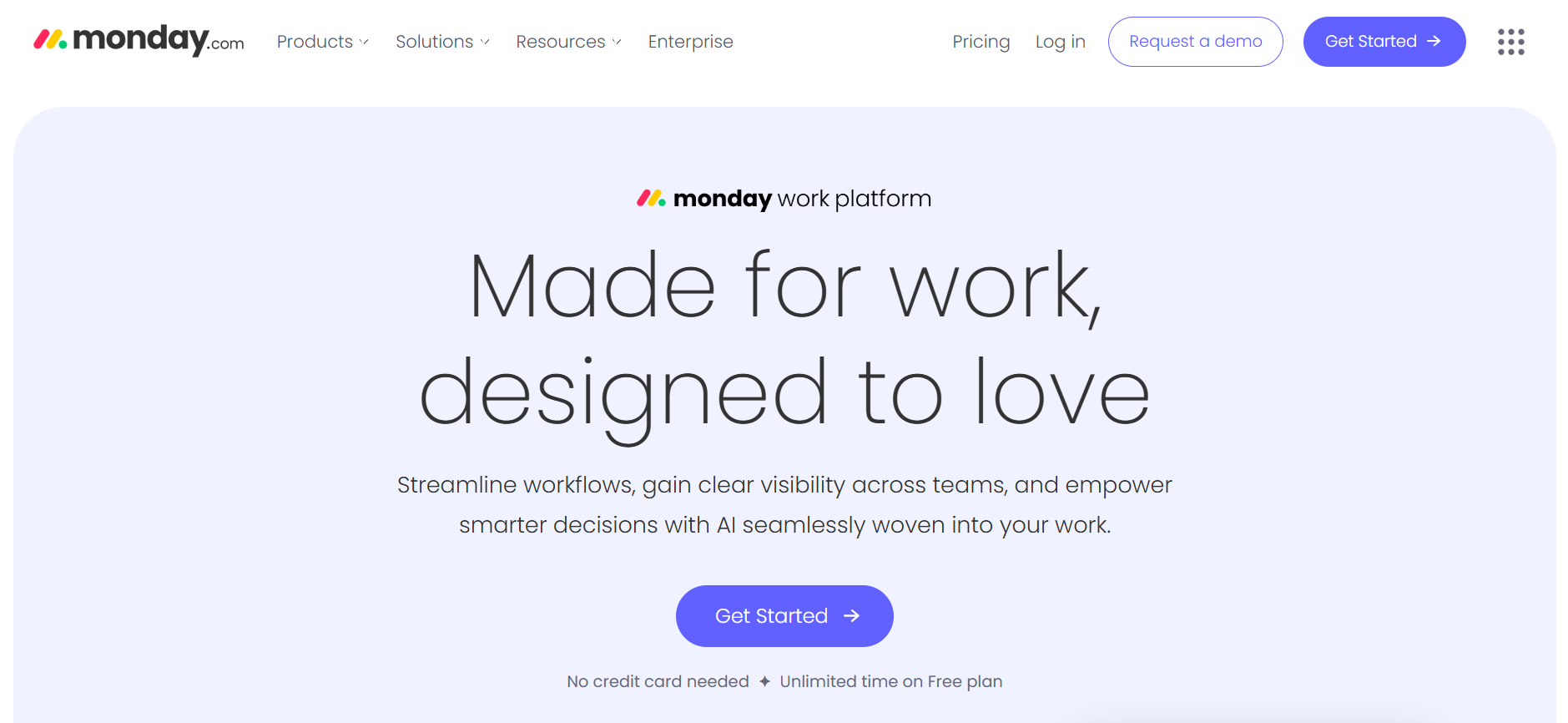
Monday.com is a highly customizable and user-friendly project management platform that helps businesses of all sizes track and manage their work. Its flexibility allows teams to create their own workflows, automate tasks, and visually monitor project progress in a collaborative environment. Monday.com stands out with its ability to manage a wide range of projects, from simple task tracking to complex project coordination, making it ideal for both small teams and large organizations.
Review
Monday.com enables businesses to stay organized by providing a visual platform where teams can collaborate in real-time. Whether you’re managing tasks, timelines, or team communication, Monday.com offers the flexibility to adapt to various workflows. With its rich set of features like task automation, dashboards, and file sharing, it’s an all-encompassing project management tool that fosters transparency and accountability. Additionally, its integration capabilities with other business tools make it a seamless addition to existing workflows.
Features of Monday.com
- Customizable Workflows: Easily create custom workflows and task boards to fit the needs of any project.
- Visual Project Tracking: Track project timelines, progress, and dependencies with visual Gantt charts, Kanban boards, and more.
- Automation: Automate repetitive tasks, reminders, and updates to improve team efficiency.
- Collaboration Tools: Share files, leave comments, and assign tasks directly within the platform for seamless team communication.
- Integrations: Syncs with popular tools like Google Drive, Slack, and Zoom for streamlined work processes.
Final Verdict
Monday.com’s adaptability and powerful features make it an excellent choice for teams of all sizes. Its visual interface, coupled with extensive collaboration and automation tools, can significantly boost productivity. Whether you’re tracking individual tasks or managing large-scale projects, Monday.com provides an intuitive platform to keep everything running smoothly.
Pros of Monday.com
- Highly customizable to fit diverse team needs.
- Visual interface that simplifies project tracking.
- Strong automation features that reduce manual work.
- Excellent collaboration tools to foster team communication.
- Seamless integrations with other business platforms.
Cons of Monday.com
- Pricing may be on the higher side for small businesses.
- Steep learning curve for new users.
- Some features are only available in higher-tier plans.
#5 -Trello – Visual Task Management with Kanban Boards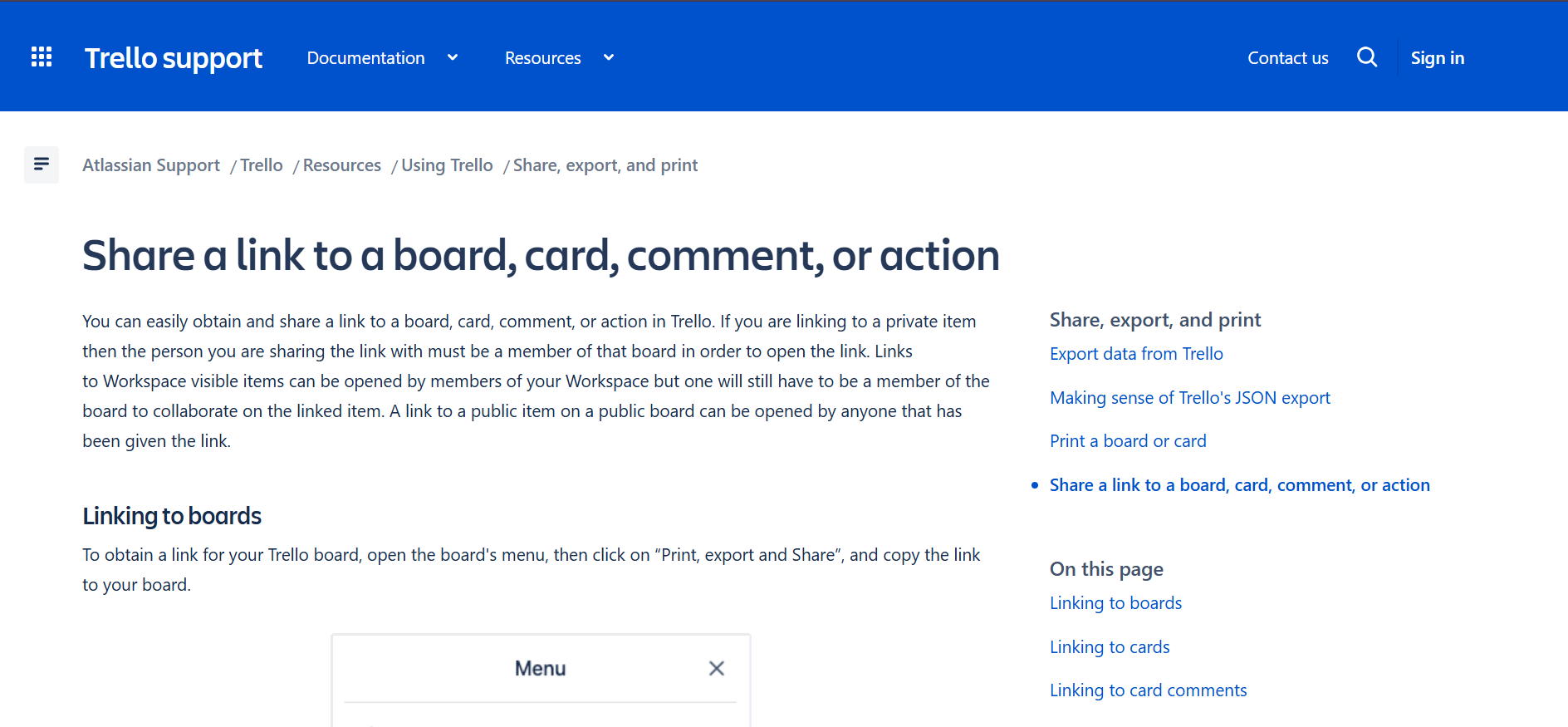
Trello is a popular task management tool known for its simplicity and visual approach to organizing work. It uses a Kanban-style board system, making it easy for teams to visually track tasks, collaborate on projects, and prioritize workloads. Trello is particularly suited for teams that need a lightweight, easy-to-use tool without unnecessary complexity.
Review
Trello provides a simple, visual interface that is easy to use, making it ideal for teams of all sizes. The Kanban boards are intuitive, and users can create custom lists and cards to organize tasks in a visually appealing way. It is perfect for teams that need to manage projects in a flexible and transparent manner, allowing for quick updates and seamless communication. While it is highly functional, it may lack some advanced project management features found in more complex platforms.
Features of Trello
- Kanban Boards: Organize tasks and projects using customizable boards, lists, and cards.
- Collaboration Tools: Share boards, assign tasks, and leave comments to keep the team aligned.
- Due Dates & Reminders: Set deadlines for tasks and receive reminders to keep projects on track.
- Power-Ups: Enhance Trello’s functionality with integrations like Slack, Google Drive, and more.
- Mobile App: Manage tasks on the go with the Trello mobile app for iOS and Android.
Final Verdict
Trello is an excellent tool for teams looking for a simple, visual way to manage tasks and projects. Its ease of use, along with its flexibility, makes it a great option for businesses of all sizes. However, for teams requiring more advanced project management features, it may not be the most robust solution.
Pros of Trello
- Simple, intuitive, and easy to use.
- Highly visual Kanban boards for task management.
- Free version with ample functionality.
- Integrates with a variety of business tools via Power-Ups.
- Mobile app for managing tasks on the go.
Cons of Trello
- Limited features in the free version.
- Lacks advanced project management features.
- Can get cluttered with large projects or complex workflows.
#6 – Zoho CRM – Streamlines Sales and Customer Data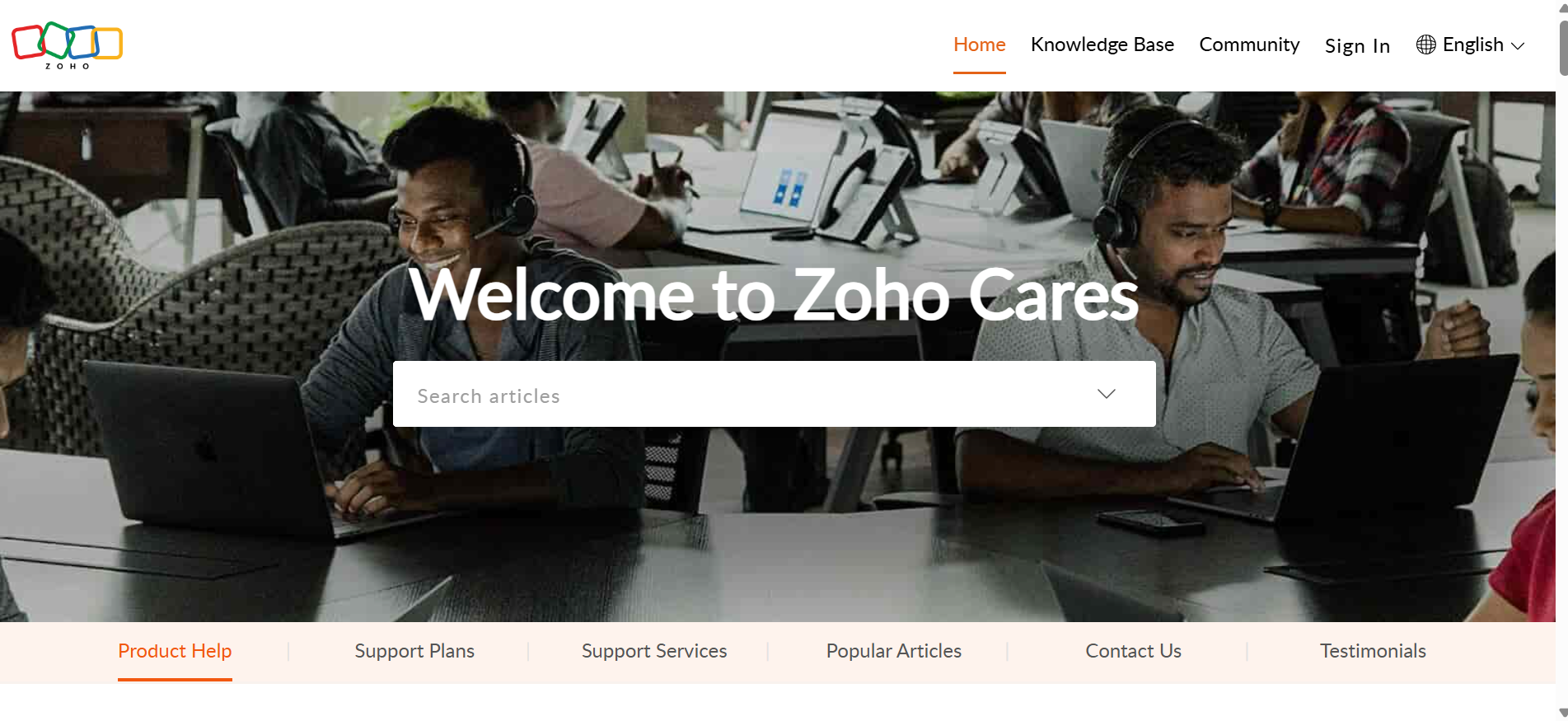
Zoho CRM is a cloud-based customer relationship management tool designed to help businesses of all sizes streamline their sales processes. Zoho CRM offers a wide array of features that enable sales teams to track leads, manage customer data, and automate communication, all in one place. Its intuitive interface and customizable workflows make it easy for teams to manage customer interactions effectively.
Review
Zoho CRM is a robust tool that covers all aspects of customer relationship management, from lead generation to post-sale follow-up. Its seamless integration with other Zoho products and third-party platforms makes it easy for businesses to centralize their sales data. Zoho CRM is well-suited for companies looking for an affordable yet powerful CRM tool that can scale with their needs.
Features of Zoho CRM
- Lead Management: Capture, track, and nurture leads from various channels.
- Sales Automation: Automate repetitive tasks, emails, and follow-up reminders.
- Customization: Customize dashboards, modules, and workflows to suit business needs.
- Analytics and Reporting: Generate detailed sales reports and insights to track performance.
- Integration: Integrates with other Zoho apps, as well as third-party platforms like Google and Mailchimp.
Final Verdict
Zoho CRM is a solid choice for small to medium-sized businesses looking for an affordable yet feature-rich CRM tool. Its wide range of integrations and automation features make it an excellent option for sales teams looking to streamline their workflows and boost efficiency.
Pros of Zoho CRM
- Affordable pricing with a free plan for small teams.
- Strong automation features for sales processes.
- Highly customizable to suit business needs.
- Integrates with other Zoho apps and third-party tools.
- Easy-to-use interface with detailed reporting capabilities.
Cons of Zoho CRM
- Limited features in the free version
- Customer support can be slow at times.
- Can become complex when scaling to large organizations.
#7 – Slack – Real-Time Team Messaging and File Sharing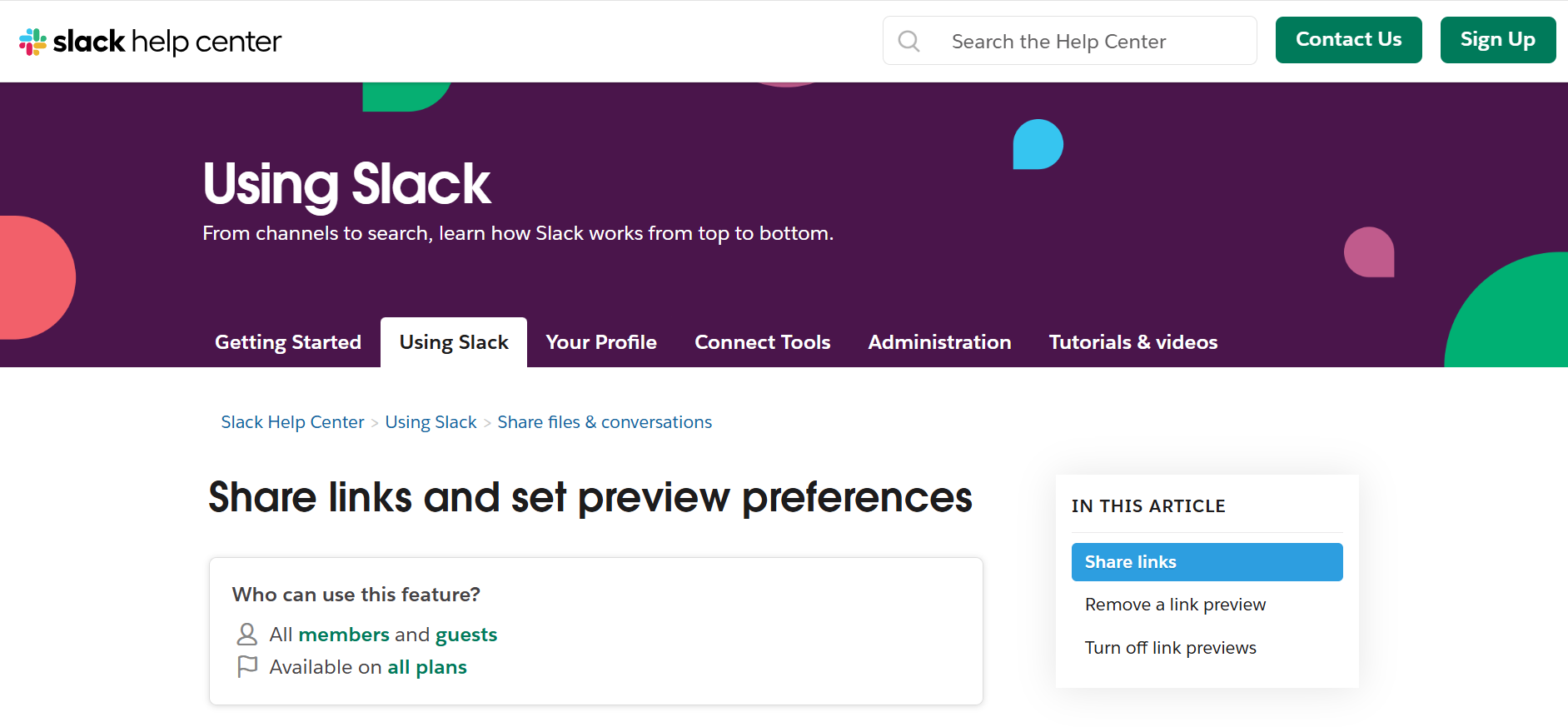
Slack is a popular team communication platform that helps businesses streamline internal messaging and collaboration. With real-time messaging, file sharing, and integration with third-party tools, Slack helps teams communicate more effectively and stay organized. It’s used by companies of all sizes to facilitate smooth communication across departments and locations.
Review
Slack is a dynamic team collaboration tool that supports both instant messaging and file sharing in a single platform. Its channel-based organization makes it easy to categorize conversations by project or department, allowing teams to collaborate seamlessly. Slack’s powerful integrations with apps like Google Drive, Trello, and Zoom make it an all-in-one solution for team communication and project management.
Features of Slack
- Real-Time Messaging: Communicate instantly with team members in public or private channels.
- File Sharing: Easily share files, documents, and images directly within Slack channels.
- Searchable History: Find past conversations and files with the platform’s robust search function.
- App Integrations: Integrate Slack with popular business tools like Google Drive, Zoom, and Asana.
- Voice and Video Calls: Conduct voice and video calls directly within the app.
Final Verdict
Slack is an excellent communication tool that enhances team collaboration through real-time messaging, file sharing, and app integrations. It’s a must-have for teams looking to streamline their communication processes. However, for teams with simpler needs, it may feel overly complex.
Pros of Slack
- Real-time messaging and collaboration.
- Extensive integration options with business tools.
- Supports file sharing and video calls.
- Easy-to-navigate interface with strong search functionality.
- Mobile app for team communication on the go.
Cons of Slack
- Can be overwhelming for small teams or simple projects.
- Free version is limited in terms of features.
- Can get cluttered with excessive channels and notifications.
#8 – Microsoft 365 – Full Suite of Productivity Tools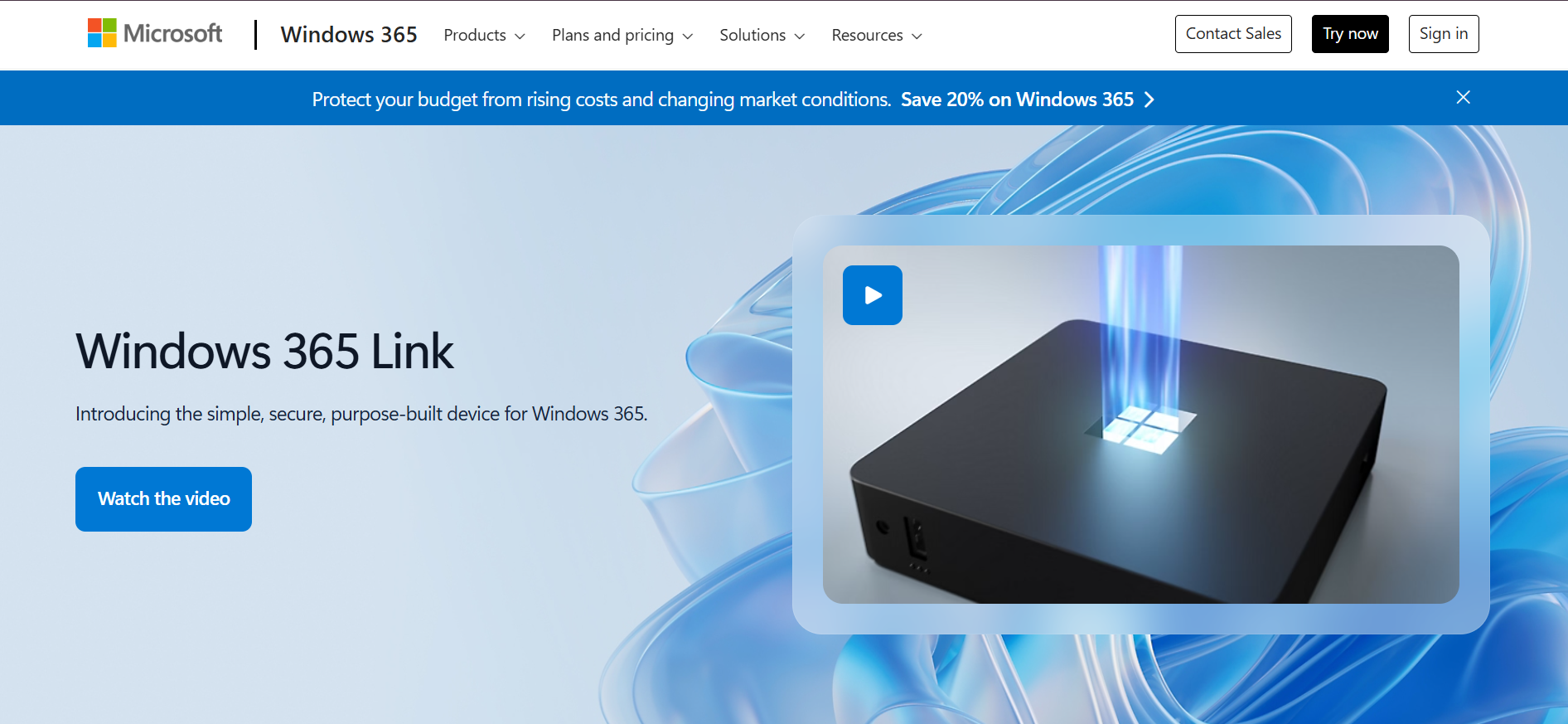
Microsoft 365 remains a staple productivity suite for UK businesses across industries. It combines powerful tools like Word, Excel, Outlook, Teams, and OneDrive under one platform. With cloud integration, real-time collaboration, and enterprise-grade security, Microsoft 365 is built to support remote work, communication, and project coordination all while improving team productivity.
Microsoft 365 is ideal for startups, SMEs, and large enterprises alike. It offers tailored packages based on business size and needs, allowing organizations to streamline tasks, manage documents securely, and enable hybrid teams to collaborate efficiently. This platform has evolved far beyond traditional Office software, now providing a centralized ecosystem for daily operations.
Review
Microsoft 365 empowers businesses with a connected and flexible work environment. Teams can collaborate in real-time on documents, manage meetings through Microsoft Teams, and safely store files in OneDrive. For UK businesses navigating hybrid or remote models, Microsoft 365 offers unmatched versatility.
Its integration with SharePoint and other Microsoft services enhances workflow automation, compliance management, and productivity tracking. Users benefit from regular updates, ensuring access to the latest tools and security improvements. With built-in AI features like predictive text and smart suggestions, daily tasks become faster and more intuitive.
Features of Microsoft 365
- Comprehensive Productivity Tools: Access to Word, Excel, PowerPoint, Outlook, and more, all synced across devices and available via the cloud.
- Microsoft Teams Integration: Seamless chat, video calls, file sharing, and project collaboration in one workspace.
- Advanced Cloud Storage: OneDrive provides secure file storage with real-time syncing and easy sharing options.
- Security and Compliance: Built-in encryption, multi-factor authentication, and GDPR-ready tools ensure UK businesses stay compliant.
- AI-Enhanced Productivity: Smart features like data analysis in Excel, Editor in Word, and meeting recaps in Teams help teams work smarter.
Final Verdict
Microsoft 365 continues to set the standard for productivity and collaboration software. Its robust security, ease of use, and deep integration with other Microsoft services make it indispensable for UK businesses. Whether you’re scaling up or managing complex projects, Microsoft 365 ensures your team stays connected, productive, and secure.
Pros of Microsoft 365
- Includes best-in-class productivity and communication tools.
Supports remote and hybrid work models. - Scalable for businesses of any size.
- Offers regular updates and feature enhancements.
- Strong data protection and compliance tools for UK regulations.
Cons of Microsoft 365
- Can be expensive for larger teams on premium plans.
- Initial setup and admin configurations may be complex.
- Internet dependency for full functionality in cloud-based tools.
#9 – Google Workspace – Smart, Cloud-Based Collaboration Tools for Modern UK Teams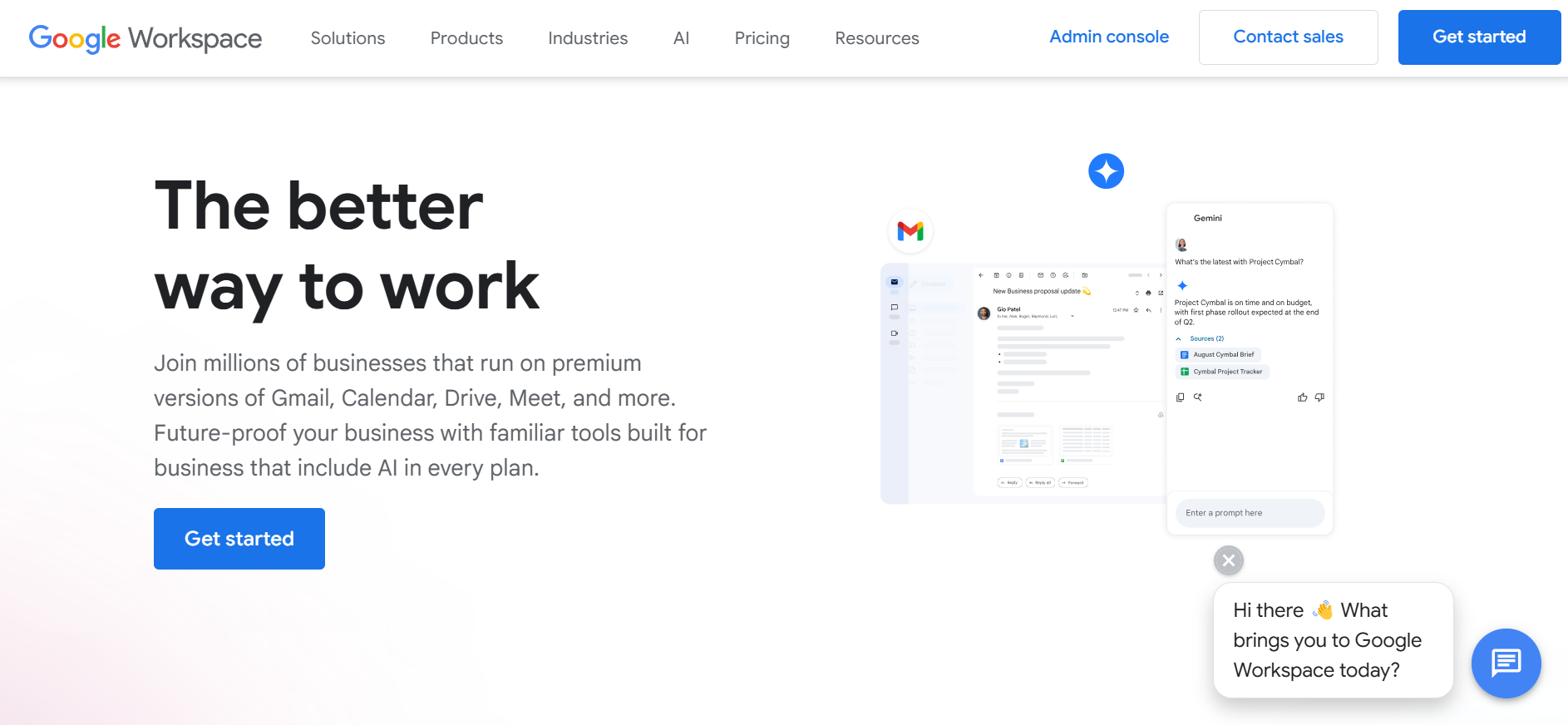
Google Workspace (formerly G Suite) is a leading cloud-based productivity and collaboration suite used widely across UK businesses. From small startups to large enterprises, its suite of apps Gmail, Google Docs, Sheets, Meet, and Drive enables teams to collaborate effortlessly in real time from anywhere. Its cloud-native architecture and user-friendly design make it especially attractive for remote and hybrid work environments.
UK companies value Google Workspace for its simplicity, affordability, and seamless accessibility across devices. Whether it’s document creation, video meetings, or email management, everything is tightly integrated and hosted securely on Google’s powerful infrastructure.
Review
Google Workspace excels at creating a connected work environment where everything you need is just a tab away. UK businesses appreciate its intuitive UI and mobile-friendly features, making it easy for teams to collaborate in real time without the need for complex setups.
The real-time editing in Google Docs, Sheets, and Slides allows for smooth content collaboration, while Google Meet delivers reliable video conferencing capabilities. Admin tools give businesses control over user access, device management, and data security. For businesses looking for flexibility, simplicity, and cost-effectiveness, Google Workspace is an excellent choice.
Features of Google Workspace
- Real-Time Collaboration: Team members can edit the same document simultaneously, with live comments and version tracking.
- Secure Cloud Storage: Google Drive provides shared and personal storage, ensuring files are accessible and backed up.
- Communication Tools: Gmail for professional email, Google Chat for instant messaging, and Google Meet for high-quality video calls.
- Seamless Integration: Native integration with third-party apps, CRMs, project management tools, and mobile devices.
- Admin Controls & Security: Centralized admin console, two-factor authentication, and GDPR compliance for UK-based businesses.
Final Verdict
Google Workspace is a flexible, cloud-first platform that empowers UK businesses to collaborate, communicate, and manage work more efficiently. Its lightweight structure, strong collaboration tools, and affordable pricing tiers make it an excellent alternative to traditional office suites. It’s perfect for fast-moving teams that value agility and connectivity.
Pros of Google Workspace
- Real-time collaboration and cloud access on any device.
- Simple interface that requires minimal training.
- Scales easily for startups, SMEs, and larger organizations.
- Competitive pricing, especially for small teams.
- Reliable uptime and data security backed by Google.
Cons of Google Workspace
- Limited offline functionality compared to desktop-based tools.
- Some advanced spreadsheet and formatting features lag behind Excel.
- File structure in Drive can become chaotic without strict organization.
#10 – Salesforce – Advanced CRM and Analytics Platform Powering UK Business Growth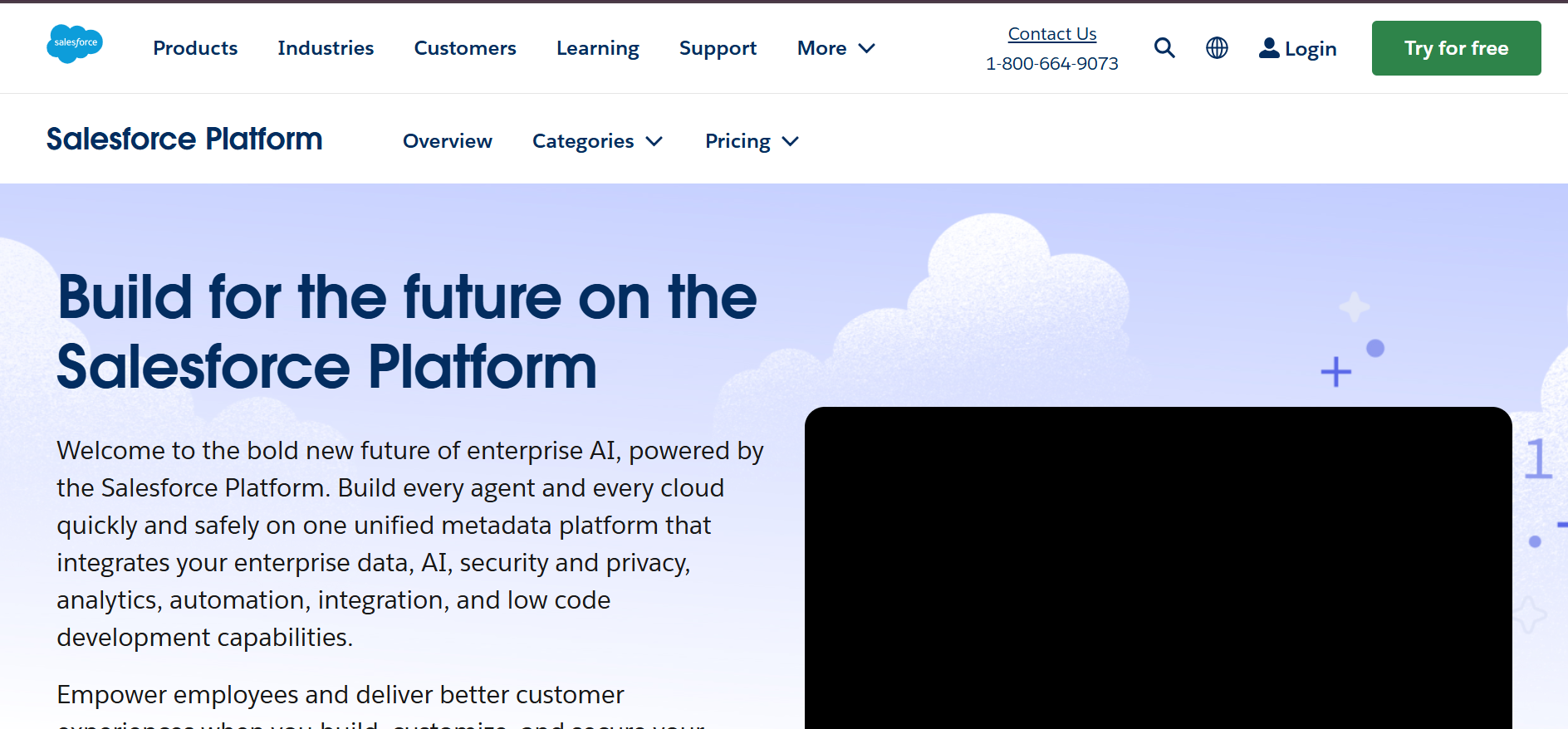
Salesforce is one of the most powerful and widely used customer relationship management (CRM) platforms in the UK and around the globe. Designed for businesses seeking deeper customer insights, streamlined sales processes, and advanced automation, Salesforce delivers enterprise-level features tailored for small businesses, mid-sized companies, and large enterprises alike.
For UK organizations focused on long-term growth and customer loyalty, Salesforce stands out with its AI-powered analytics, marketing automation, and customizable workflows. Its ecosystem is vast, covering everything from service management to commerce and app development, making it a complete digital transformation tool.
Review
Salesforce brings a new level of intelligence and control to customer management. Its modular structure means businesses in the UK can start with the basics like contact and opportunity management and scale into more complex features such as predictive analytics and automated marketing campaigns.
The platform’s AI feature, Einstein, delivers smart recommendations and sales forecasts, while integrations with tools like Slack, Outlook, and Google Workspace further enhance productivity. Salesforce is especially valuable for industries with complex sales cycles, like finance, legal services, real estate, and B2B enterprises.
Features of Salesforce
- 360° Customer View: Access customer data across all touchpoints from lead to loyalty in a centralized dashboard.
- Sales and Marketing Automation: Streamline lead nurturing, follow-ups, and campaigns with automated workflows.
- Customizable Dashboards: Visualize key performance indicators (KPIs), forecasts, and trends tailored to your goals.
- AI-Powered Insights (Einstein): Receive smart suggestions, predictions, and analytics to guide decision-making.
- AppExchange Marketplace: Extend Salesforce functionality with thousands of third-party business applications.
Final Verdict
Salesforce is more than a CRM it’s a robust business platform designed to optimize customer engagement, marketing efforts, and internal efficiency. While it requires a learning curve and investment, UK businesses that prioritize growth, scalability, and data-driven decisions will find Salesforce an invaluable asset.
Pros of Salesforce
- Unmatched customization and scalability for businesses of all sizes.
- Deep reporting and analytics for data-driven insights.
- Strong community, training resources, and third-party integrations.
- Ideal for sales, service, and marketing teams working together.
Cons of Salesforce
- Higher learning curve for new users or small businesses.
- Premium features can lead to high costs, especially with add-ons.
- Custom setup may require developer support or consultants.
#11 – Shopify – Leading UK E-commerce Platform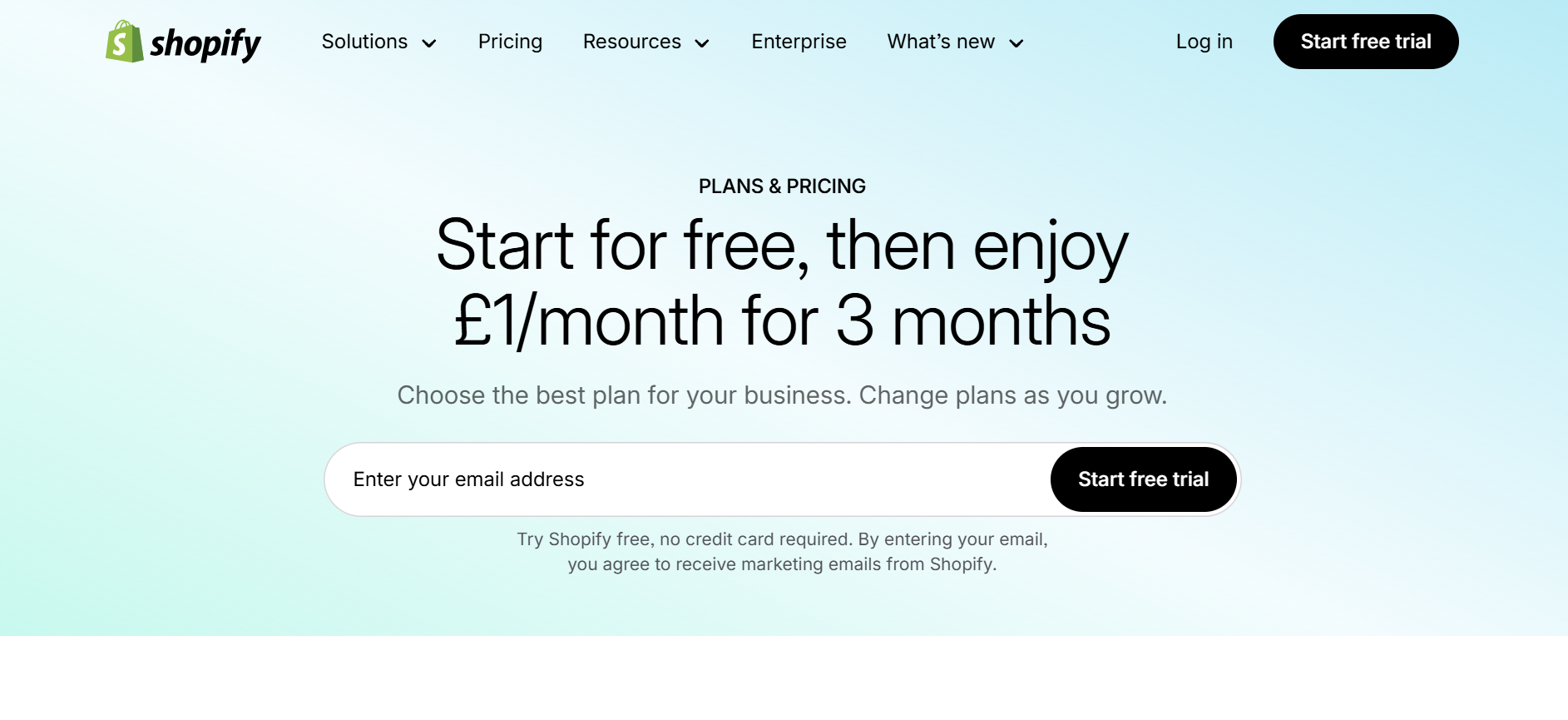
Shopify is one of the most popular e-commerce platforms globally, and it has earned a solid reputation in the UK market for enabling businesses to set up, run, and grow their online stores effortlessly. It offers a user-friendly interface, rich customization features, and a wide variety of tools tailored for merchants who want to expand their reach and simplify the selling process. Whether you’re an entrepreneur launching a new store or an established brand looking to improve your digital presence, Shopify provides everything you need to build and manage a high-performance online business.
Review of Shopify
Shopify has become a go-to e-commerce solution for UK businesses due to its ease of use and rich ecosystem of themes, apps, and integrations. Setting up a store is simple even for those with no technical knowledge, and the platform provides powerful tools for inventory management, payment processing, shipping, and marketing. Its mobile-responsive design ensures a seamless shopping experience across all devices, while its POS capabilities help bridge the gap between online and offline sales. The ability to connect with major marketplaces like Amazon and eBay further strengthens Shopify’s appeal.
Features of Shopify
- Store Customization: Offers a vast range of professionally designed themes and the ability to customize through code or drag-and-drop tools.
- Payment Integration: Supports multiple payment gateways including Shopify Payments, PayPal, Stripe, and local UK options.
- Marketing Tools: Built-in SEO features, email marketing integrations, discount code generation, and analytics tools.
- Inventory and Order Management: Real-time updates on stock levels, automatic order tracking, and fulfillment options.
- App Marketplace: Thousands of apps for extending store functionality, covering everything from accounting to loyalty programs.
Final Verdict on Shopify
Shopify stands out as a comprehensive e-commerce platform for UK businesses of all sizes. Its intuitive setup, strong support, and powerful integrations make it a strong contender in any industry. Whether you’re selling physical products, digital goods, or subscription services, Shopify adapts to your needs. It helps merchants focus more on growing their business and less on managing technical challenges.
Pros of Shopify
- Intuitive interface and easy setup process
- Wide variety of customizable themes
- Scalable from small stores to enterprise solutions
- Extensive app ecosystem
- Excellent customer support and community resources
Cons of Shopify
- Monthly fees can add up with paid apps and themes
- Transaction fees for using third-party payment gateways
- Some advanced customizations require coding knowledge
#12 – FreshBooks – Easy Accounting for UK Freelancers and Small Businesses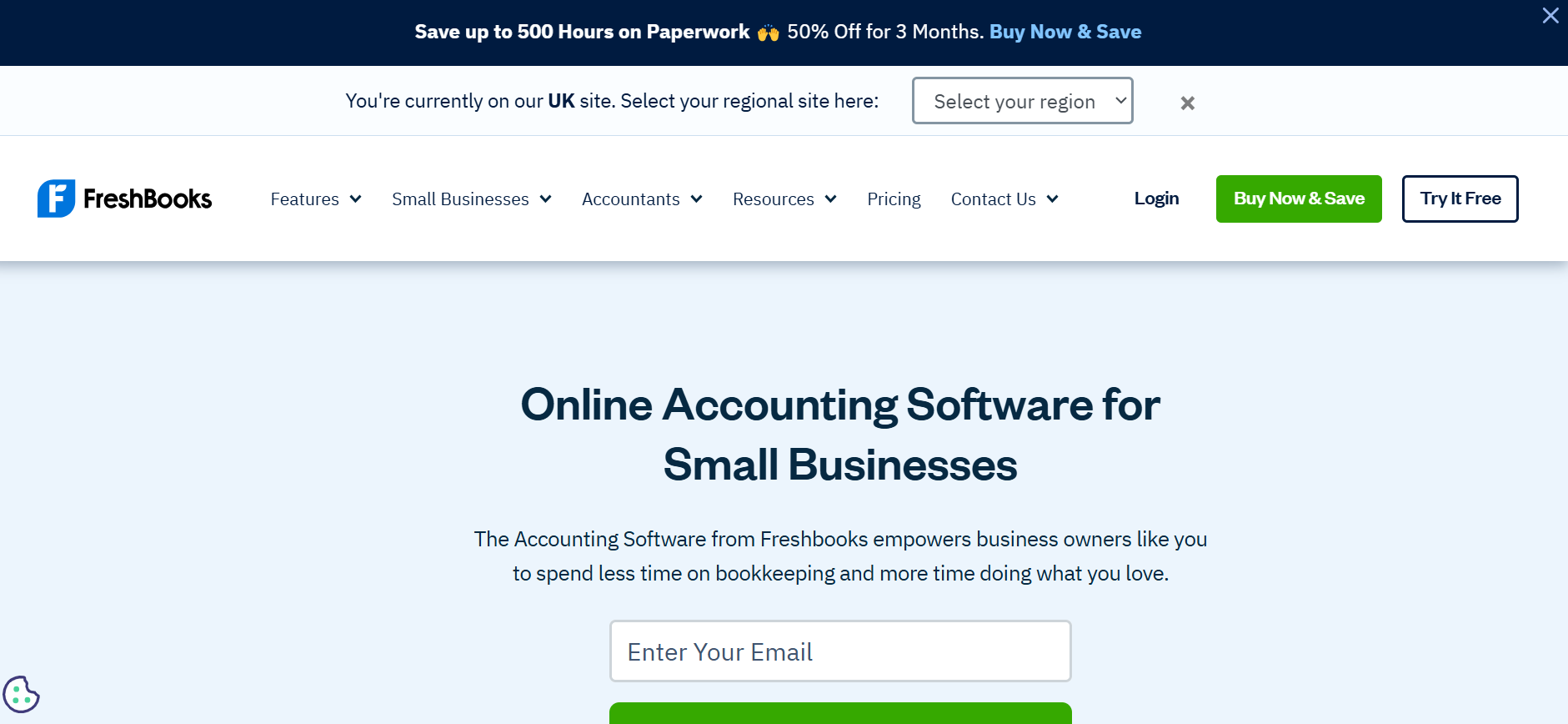
FreshBooks is a cloud-based accounting solution specifically built for freelancers and small businesses in the UK who want to streamline their finances without diving into complex systems. Designed with simplicity and usability in mind, FreshBooks helps users manage invoices, expenses, time tracking, and client communications—all from a single, easy-to-navigate platform. It’s tailored for service-based businesses that prioritize client relationships, offering intuitive tools that make billing, tracking, and organizing financial tasks incredibly efficient.
Review
FreshBooks stands out in the crowded accounting software space thanks to its clean interface, automation tools, and dedication to user experience. It allows users to send professional invoices, track time for billable hours, record expenses, and even accept payments online. Freelancers and sole traders especially appreciate its simplicity, while still enjoying features that meet Making Tax Digital (MTD) requirements in the UK. Moreover, FreshBooks provides automation for recurring invoices, late payment reminders, and expense categorization giving users more time to focus on growing their businesses.
The software’s UK-specific tax and VAT handling make it an ideal choice for local freelancers looking to remain compliant without hiring an accountant. FreshBooks also offers robust customer support via phone, chat, and email, making it a reliable option for users who prefer guided assistance over self-help documentation.
Features of FreshBooks
- Custom Invoicing Tools
Create and personalize professional invoices with your logo, branding, and payment terms. Automatically send recurring invoices and reminders. - Expense Management
Easily track expenses by snapping photos of receipts and categorizing them within the app. Link bank accounts for automated data imports. - Time Tracking
Log hours worked and assign them to projects or clients. Ideal for service-based professionals who bill hourly. - Online Payments Integration
Accept credit card payments, Stripe, and PayPal directly through invoices, enabling faster payments and smoother cash flow. - VAT and Tax Reports
Generate tax-friendly reports tailored to UK requirements, including MTD-compatible VAT summaries and expense reports. - Mobile App Access
Manage your finances on the go with Android and iOS apps, enabling you to invoice clients and track time anywhere, anytime.
Final Verdict
FreshBooks is a top-tier accounting solution for UK-based freelancers, self-employed professionals, and small businesses that want a simple yet powerful tool to manage their finances. Its clean interface, robust mobile features, and reliable customer support make it one of the best entry-level platforms for financial tracking and client billing. If you’re in the creative or consulting sector, FreshBooks will help you stay on top of invoicing and compliance without feeling overwhelmed by traditional accounting systems.
Pros of FreshBooks
- Exceptionally user-friendly for freelancers and sole traders
- VAT-compliant and Making Tax Digital ready
- Excellent customer support via multiple channels
- Automatic expense and time tracking
- Mobile access for on-the-go invoicing and payments
Cons of FreshBooks
- Limited advanced accounting features for larger businesses
- Project management tools are basic compared to alternatives
- Pricing can increase as client list grows
- Customization is slightly limited in lower-tier plans
#13 – ClickUp – Centralized Work Hub for UK Teams Across All Departments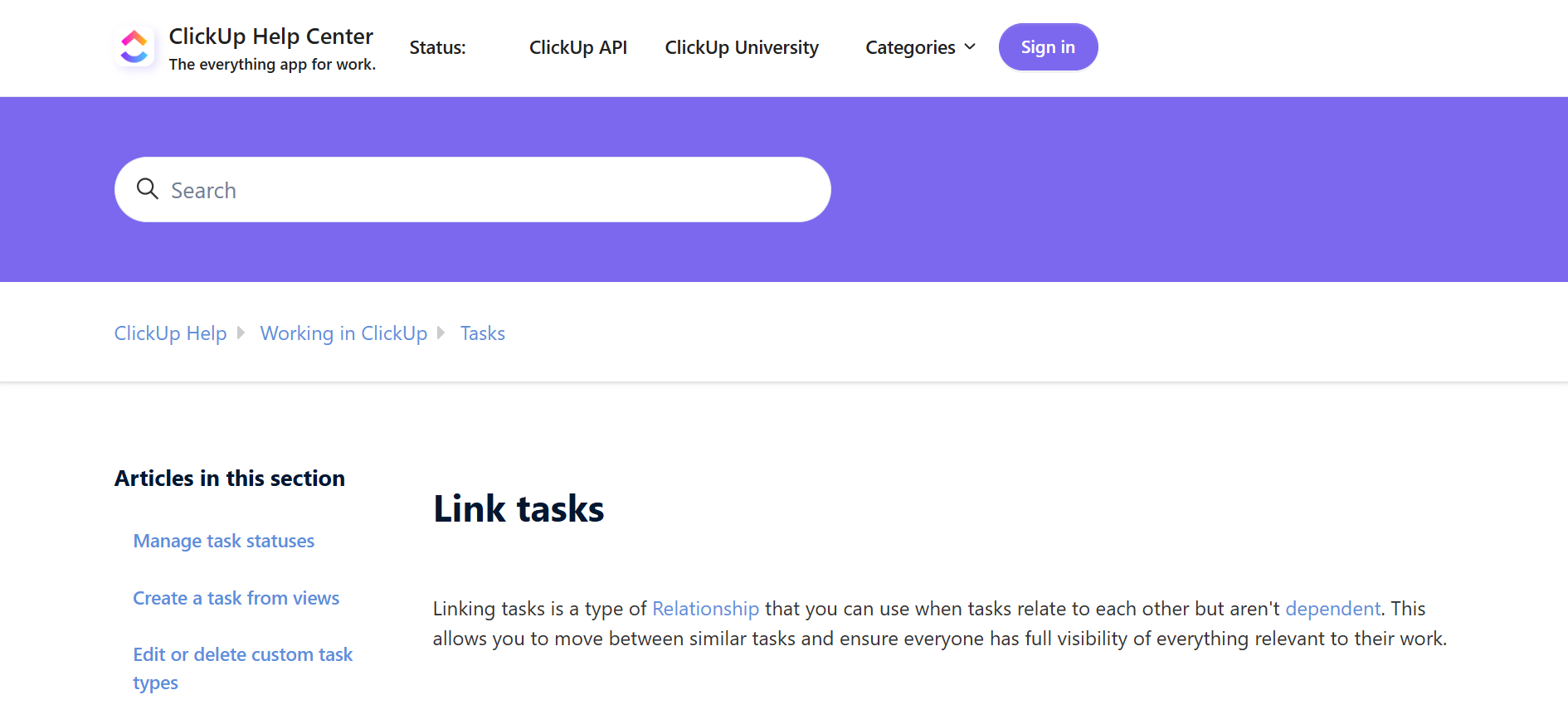
ClickUp is a highly customizable and all-in-one productivity platform designed to unify tasks, docs, goals, and project tracking under one roof. UK-based teams across industries—from marketing to IT trust ClickUp for its ability to replace multiple tools with a single, streamlined workspace. Whether you’re a startup needing basic task management or an enterprise seeking cross-functional collaboration, ClickUp adapts to your workflow instead of forcing you to adapt to its design.
Review
ClickUp delivers a flexible project and task management experience that suits everything from daily to-do lists to complex enterprise project planning. With a modular structure, teams can tailor views such as Kanban boards, Gantt charts, lists, calendars, and timelines based on their preferences and project needs.
UK businesses particularly benefit from ClickUp’s GDPR compliance, strong data encryption, and team-level permission controls. It also integrates well with tools like Slack, Zoom, Microsoft Teams, and Google Workspace, helping UK companies centralize collaboration across remote or hybrid teams.
Features of ClickUp
- Customizable Workspaces
Structure projects the way your team works best using folders, spaces, lists, and tasks with drag-and-drop simplicity. - Multiple Project Views
Choose from board, list, calendar, Gantt, and workload views to manage tasks visually or in detail, depending on project needs. - Built-In Docs and Notes
Create wikis, SOPs, and knowledge bases directly in ClickUp. Collaborate in real-time with comments and version control. - Automation and Templates
Set triggers for recurring tasks, reminders, and status changes using ClickUp’s no-code automation. Use pre-built templates for faster onboarding. - Goal and Time Tracking
Align team tasks with overarching goals and measure progress. Log time spent on each task using built-in or third-party time trackers. - Communication Tools
Leave comments, assign tasks through mentions, and integrate with chat tools to streamline internal communication.
Final Verdict
ClickUp is one of the most powerful productivity tools available for UK businesses looking to consolidate operations into a single digital workspace. It’s ideal for companies seeking cross-departmental collaboration, detailed project visibility, and flexible workflow customization. From agile software teams to marketing agencies and consultancies, ClickUp scales beautifully with growing business demands. Its sleek design, responsive support, and feature-rich interface make it a top-tier choice for productivity and task management.
Pros of ClickUp
- Highly customizable for different workflows and team structures
- Supports multiple project views to suit varied preferences
- Free version is generous with features
- Centralizes tasks, docs, and time tracking in one place
- Strong UK customer support and GDPR compliance
Cons of ClickUp
- Steep learning curve due to vast functionality
- Occasional performance lags with very large data sets
- Some automation features are only in higher-tier plans
- Mobile app can feel cluttered for new users
#14 – Notion – All-in-One Digital Workspace for Seamless Collaboration and Organization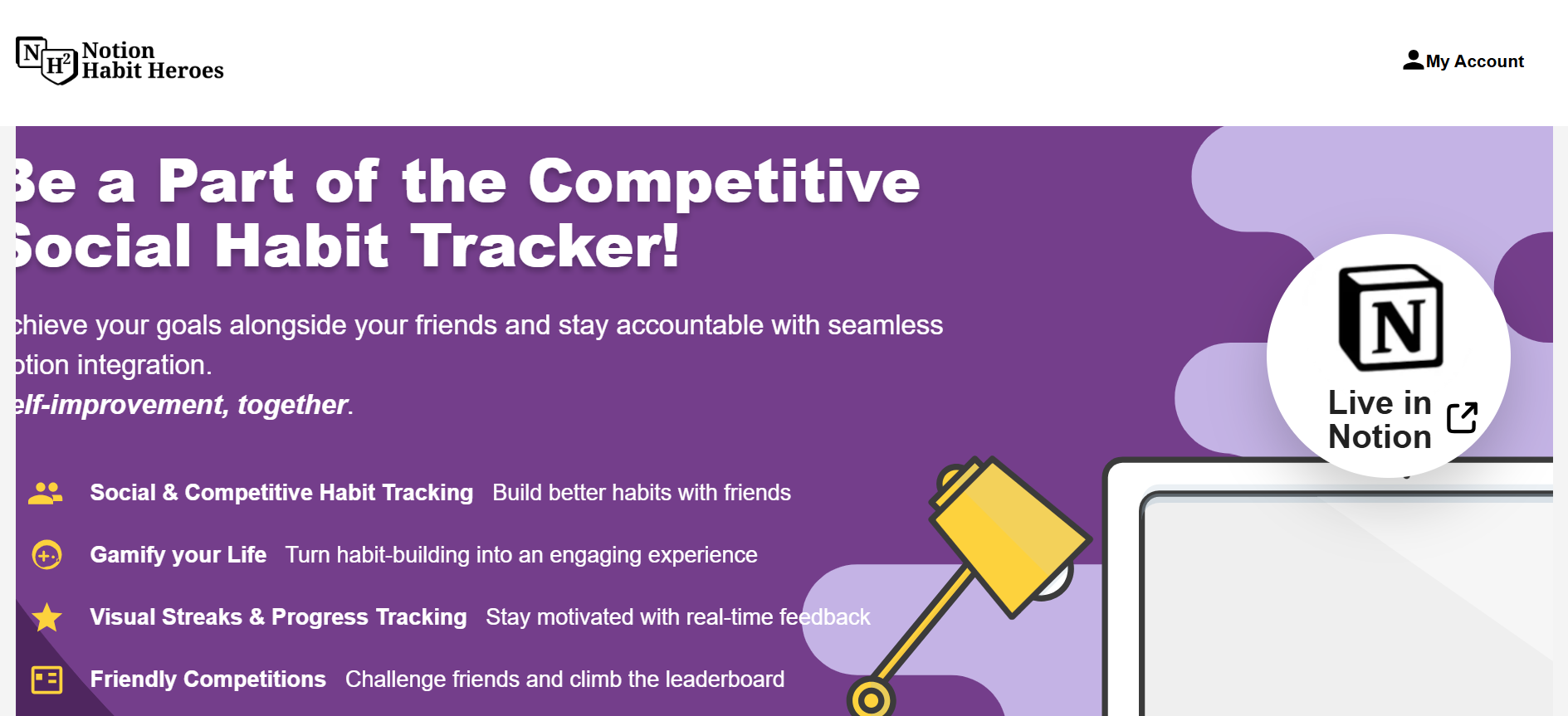
Notion is a versatile, all-in-one workspace that offers the flexibility to manage tasks, databases, notes, documents, and wikis in one place. It’s a favorite among UK businesses for its clean interface and the power to organize anything from simple to complex workflows. Whether you’re managing individual tasks or collaborating on large-scale projects, Notion empowers teams to work smarter and stay aligned without juggling multiple tools.
Review
Notion’s charm lies in its simplicity and depth. On one hand, it’s as easy to use as a digital notebook, but it also offers sophisticated features like databases, tables, task boards, and wikis to handle advanced project management needs. UK businesses find Notion especially valuable for creating collaborative workspaces, organizing meeting notes, tracking goals, and managing client projects.
For teams in the UK, Notion’s ease of use and intuitive interface help streamline workflows, reduce clutter, and ensure teams can focus on what matters most. Additionally, its flexible permission structure makes it an ideal solution for teams that require granular control over content access.
Features of Notion
- Modular Page System
Build your workspace from the ground up with pages, sub-pages, and nested databases, all linked to create dynamic content. - Task and Project Management
Track to-do lists, deadlines, and team responsibilities using task boards or calendars. Custom filters and views enhance your team’s project tracking. - Database and Table Management
Create rich databases with customizable columns and properties, from task status to priority levels. Sort and filter to find exactly what you need. - Collaboration and Sharing
Collaborate with team members in real-time, assign tasks, and comment directly on pages. Share pages externally or lock down access for team privacy. - Templates and Widgets
Easily create repeatable workflows or import pre-made templates for projects, meetings, and personal productivity. Add widgets like calendars, weather forecasts, and task widgets for better customization. - Cross-Platform Support
Notion works seamlessly on macOS, Windows, iOS, and Android, making it easy to collaborate regardless of device or location.
Final Verdict
Notion is an all-encompassing tool that shines in its simplicity while offering deep customization. UK businesses particularly those with small to medium-sized teams—will find it an invaluable tool for everything from personal task tracking to collaborative project management. With its flexible design, robust feature set, and cost-effective pricing, Notion is a top contender for any business looking to centralize their digital workspace.
Pros of Notion
- Highly customizable for personal and team use
- Intuitive interface with drag-and-drop functionality
- Ideal for both simple note-taking and complex project management
- Cross-platform support ensures accessibility anywhere
- Collaborative features enhance team alignment and communication
Cons of Notion
- Can become overwhelming with larger, complex projects
- Lacks advanced project management features compared to dedicated tools like Asana or Monday.com
- No built-in time tracking, which could be an issue for task-oriented teams
- Limited offline access in some versions
#15 – Pleo – Smart Expense Management Solution for UK Teams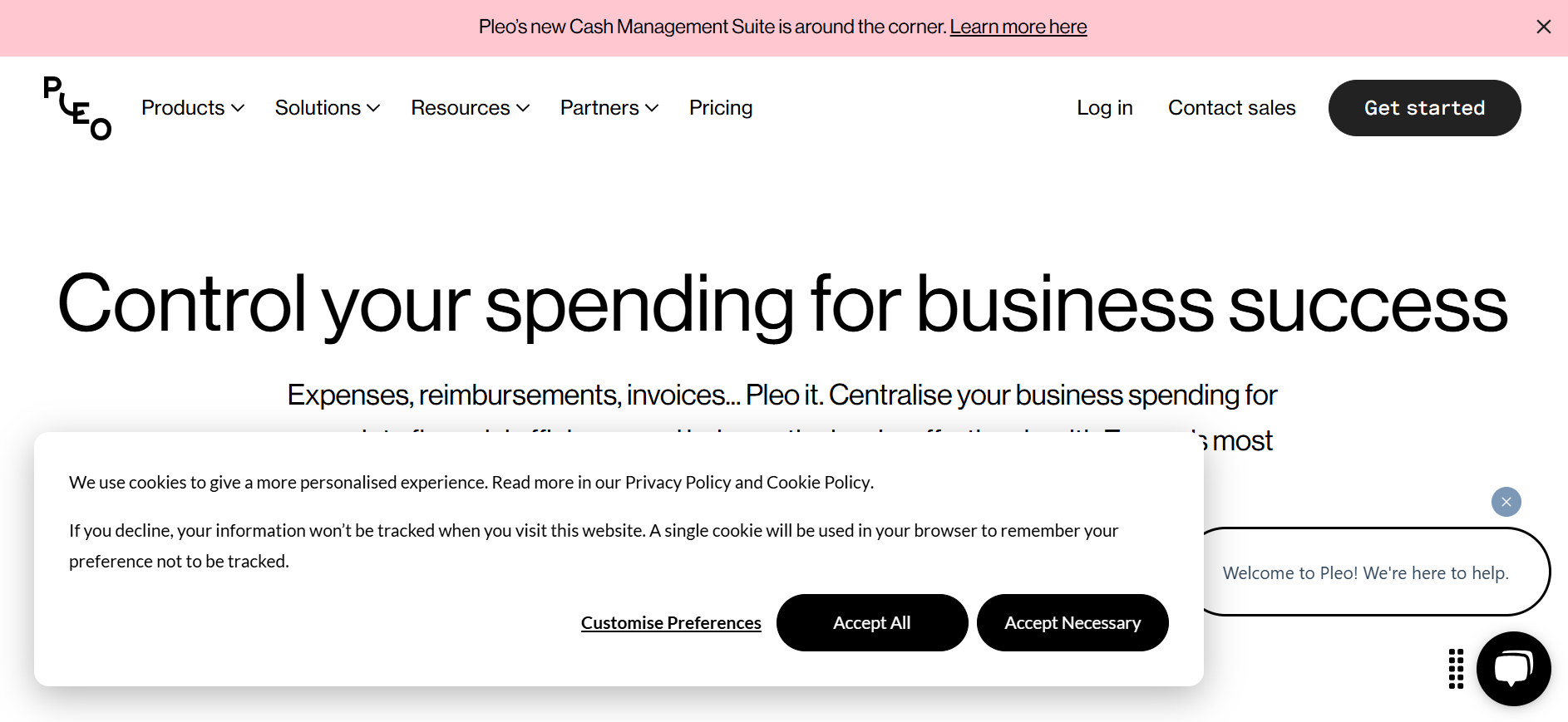
Pleo offers an innovative way to manage company expenses and streamline the reimbursement process. Designed to simplify how businesses in the UK handle employee spending, Pleo provides smart corporate cards, automated receipt matching, and real-time reporting, all in one platform. Whether you’re a startup or a larger enterprise, Pleo makes expense management transparent, efficient, and stress-free.
Review
Pleo is a game-changer in the world of expense management, offering UK businesses a modern solution to outdated, manual processes. The platform stands out with its intuitive corporate cards, which employees can use for business purchases while maintaining tight control over spending. Managers can set specific spending limits and get real-time notifications to track and approve purchases as they happen.
One of Pleo’s key features is its automatic receipt capture and matching, which drastically reduces the manual effort required in expense reporting. With the ability to integrate seamlessly into accounting tools like Xero, QuickBooks, and others, Pleo ensures that businesses can keep their financials up to date without hassle.
Features of Pleo
- Smart Corporate Cards
Employees are issued with smart cards for business purchases, reducing the need for out-of-pocket expenses and simplifying the approval process. - Receipt Capture and Matching
Employees can simply take photos of receipts, which are automatically matched to transactions in the system, minimizing errors and manual work. - Real-Time Spending Tracking
Managers and finance teams get real-time visibility into employee spending, making it easy to monitor budgets and enforce spending policies. - Seamless Integrations
Pleo integrates smoothly with accounting software like Xero, QuickBooks, and Sage, allowing for automatic reconciliation and easy bookkeeping. - Expense Reporting Automation
The platform eliminates the need for manual expense claims by automating the entire process from purchase to reporting, saving time and reducing administrative burden. - Employee Benefits Management
Pleo enables businesses to set spending rules and approval workflows, ensuring that employees are compliant with company policies and spending within set limits.
Final Verdict
Pleo is an excellent solution for UK businesses looking to streamline their expense management. Its ease of use, real-time tracking, and automated features make it a top choice for organizations of all sizes. With the added benefit of seamless integrations with accounting tools, Pleo is an essential tool for any business that wants to simplify financial processes, improve transparency, and gain better control over expenses.
Pros of Pleo
- Easy-to-use smart cards for employees
- Real-time tracking and instant notification of expenses
- Automated receipt matching and reporting saves time
- Seamless integration with popular accounting software
- Flexible spending policies with customizable limits and approval workflows
Cons of Pleo
- Limited to businesses with a UK-based workforce (though expanding globally)
- Might be overkill for very small businesses or freelancers with minimal expenses
- Expense policies can be difficult to configure for complex businesses
- Requires a credit check for issuance of cards
Frequently Asked Questions (FAQs)
What is Pleo and how does it simplify expense management for businesses?
Pleo is a smart expense management solution that provides companies with corporate cards for employees, enabling them to make business purchases easily.
Can Pleo integrate with my accounting software?
Yes, Pleo integrates seamlessly with popular accounting tools like Xero, QuickBooks, and Sage. This allows businesses to automate the reconciliation process and ensure that financial data is always up to date.
Is Pleo suitable for small businesses or freelancers?
While Pleo is ideal for medium to large businesses, it can be a bit too complex for freelancers or very small businesses. However, it offers great value for companies with multiple employees and regular expenses, helping them manage and track spending efficiently.
Does Pleo offer real-time reporting and notifications?
Yes, Pleo provides real-time tracking of expenses and instant notifications whenever a purchase is made. This gives managers immediate visibility into company spending and helps maintain control over budgets.
What are the benefits of using Pleo over traditional expense management methods?
The main benefits of using Pleo over traditional expense management methods include automation of receipt matching, real-time expense tracking, simplified reporting, and greater transparency.
